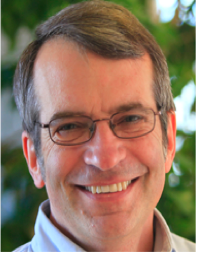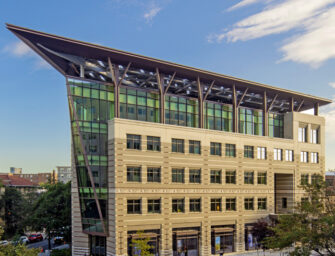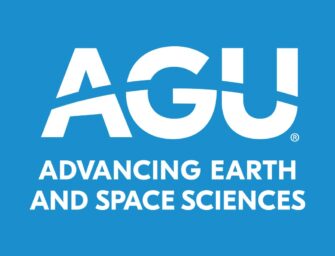Solidarity Among Scientists Across the Globe Is Needed Now More Than Ever

AGU President Eric Davidson
Frustration is mounting over nationalist policies in the U.S. and other countries, which are obstructing the free exchange of ideas and effective collaboration among scientists.
These policies have multiple impacts. The most immediate and visible human tragedies are borne by refugees and immigrants. At the same time, several academics have lost their jobs or their ability to carry out their missions where nationalist governments have restricted academic freedoms and defunded science and education. Sadly, enrollment of foreign students in U.S. universities appears to be on the decline, perhaps due to uncertainties regarding visas and concerns over reported xenophobic sentiments that our leaders appear to condone. Tightening visa restrictions in the name of national security also impedes the ability of scientists to work collaboratively to advance scientific discovery that benefits humanity.
While these trends are widespread, the actions and words of the Trump administration are receiving particular attention, for good reason. While we must respect differences of opinion regarding immigration policy and national security, we cannot remain silent when human dignity is violated, as we have recently witnessed. Equally disturbing are statements and actions that disregard the value of science-based evidence in policy making. So, what are the appropriate responses for scientific societies like the American Geophysical Union and its international membership? With about 40% of our members from outside of the U.S., this question clearly extends beyond American politics.
Support “What Science Stands For“
We must stand together to insist that scientific collaboration remains international, and interdisciplinary. I can certainly empathize with those outside the U.S. who might be considering boycotting meetings in America as a protest to several of President Trump’s policies and statements. But I would argue that such boycotts would simply advance the type of nationalism that we need to stand up against. The negative impacts of boycotts would not be felt by this administration, but the consequences for our science would be very real, indeed! As we face global challenges of managing the Earth system with human populations destined to exceed 8 and 9 billion people, we urgently need the of diverse scientific expertise and cultural perspectives that international meetings offer in order to find effective solutions.
This year’s AGU Fall Meeting in Washington DC is a particularly opportune time for showing solidarity. In addition to engaging key administration officials and bipartisan representatives of the U.S. Congress, we are inviting science attachés from several embassies and international agencies located in Washington. As always, the scientific program addresses Earth and space research. Consistent with this year’s theme of What Science Stands For, it will also feature sessions on ethics and workplace issues, such as sexual harassment, diversity and inclusion, and on career development matters, such as tenure and promotion. These topics are universally relevant, but they often have important culturally specific aspects that require diverse perspectives.
Based on what we are hearing from our members, I pledge that we will add a session on promoting international science in an increasingly nationalist world. We need you to help us stand up for What Science Stands For.
Communicating in Washington and beyond
While solidarity at meetings sends a huge signal, AGU is also working diligently in quieter ways. We are advancing bipartisan support in the U.S. Congress for science funding and policies protecting scientific integrity. We have established good working relationships with key administration appointees and career professionals within the agencies who are dedicated to advancing science. We are providing training and toolkits for our members across the world to learn to tell their stories effectively to community groups, school groups, congregations, businesses, the media, and decision makers at all levels. Engaging broadly in civil society to demonstrate the importance of science to society will be our most enduring strategy to counter the shifting political winds that follow election cycles and nationalist movements.
Science always benefits from diversity, and this is no time to allow the political climate in the U.S. and elsewhere to deter us from making our science great by fostering diverse contributions from our international membership. Whether it is this year’s AGU meeting in Washington, D.C., or any other scientific society’s meeting in the U.S. or elsewhere, I call on scientists across the globe to show solidarity for our shared values and to advance international science
Editor’s Note: This article has also been cross-posted in a slightly different form in Eos.



Great to read this pledge for solidarity. The idea of a session on promoting international science in an increasingly nationalist world is fine, but I am afraid it is rather meaningless when so many of our colleagues internationally will not be able to head to Washington because they cannot obtain Visa or simply refuse to undergo the humiliations of the immigration procedures at the border. This has nothing to do with boycotting the US, but simply with human dignity.
Perhaps the American Geophysical Union General Assembly should be held elsewhere in America and not in the US.
Thank you for this memo expressing concerns about obtaining visas to enter the U.S. for meetings such as the AGU Fall Meeting. I share your concerns, although I don’t agree that our efforts to draw attention to this problem in a session at our meeting would be “meaningless.” Even if some people can only attend the session virtually, and others come from countries where visas are less difficult to obtain or not required, an international gathering that articulates commonly held values regarding international scientific collaboration could help reinforce our joint efforts to promote those values.
In the meantime, AGU is doing all that it can to make the visa process less onerous. To address this issue, AGU registers the Fall Meeting with the U.S. State Department. This registration goes “live” in their database about six months ahead of our meeting, enabling State Department staff to quickly reference the Fall Meeting when reviewing visa applications/interviews. Furthermore, once attendee submissions for the Fall Meeting are received, we review country demographics and consider how to proactively communicate with individual scientists who may face restrictions. For example, when we understood that individuals from Turkey were going to face travel limitations, we sent messages to nine Turkish AGU member scientists to discuss how they would like to proceed and explored whether they could participate in the meeting virtually. Finally, we are actively monitoring U.S. policies that might affect travel or lead scientists to withdraw their abstracts for consideration at Fall Meeting. Of course, there are limits to our influence with the U.S. State Department, but AGU stands firm that scientific collaboration must remain international and interdisciplinary, and we are taking all steps possible to foster contributions from our international membership.
Sincerely,
Eric A. Davidson
President, The American Geophysical Union